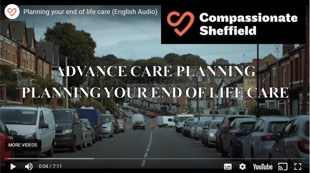Advanced Care Planning
It’s never too early to think about the type of care you might want at the end of your life.
Good care starts with a conversation. It's best to record this in an Advanced Care Plan. This tells people what you want to happen for your future care, including where you would like to die, what spiritual beliefs you would like to have followed and any practical concerns you want to be taken care of. You can give this to your family, carers and medical professionals involved in your care.
Compassionate Sheffield has launched a campaign all about encouraging and empowering people, professionals and communities to engage in and promote Advanced Care Planning.
Your Advanced Care Plan can help make sure your end of life care is person centred and that your values and choices are central to the care you receive.
 One of the resources on their website is a video to encourage you to get the conversation started.
One of the resources on their website is a video to encourage you to get the conversation started.
The video was co-produced with people from Sheffield’s Yemini, Pakistani and Roma communities, and is available in multiple languages.
Find out more about Advanced Care Planning and watch the video.
Compassionate Sheffield: Advanced Care Plan.
Help with your finances
You want to get help to make a will. A will lets people know what you would like to happen to your money, property and possessions after your death. Get more advice from the GOV.UK website.
GOV.UK: Making a will.
Help to manage your money. There are ways that your family, friends and carers can help you to manage your money and take responsibility for your finances when you can no longer make decisions for yourself. Get more advice from our Money section.
Support with managing your money.
End of life care
There are many places that specialise in supporting people in their final days. They are called hospices. Some hospices can also provide care at home. Often people are referred to a hospice by their GP, district nurse or hospital.
St Luke's is the main hospice in Sheffield. There's more detail about their support above.
You can find details of all the hospices in the UK on the Hospice UK website.
Hospice UK: Hospice Carefinder.
The main national charities supporting end of life care are Marie Curie and Sue Ryder.
Marie Curie provides frontline nursing and hospice care, a free support line and a wealth of information and support on all aspects of dying, death and bereavement.
Marie Curie: What we do.
Helpline: 0800 090 2309.
Sue Ryder supports people through a terminal illness, people dealing with the death of someone close to them, and people with a neurological condition.
Sue Ryder: What is palliative or end of life care.
Help with a specific illness or condition
Dementia, Alzheimer's and Parkinson's disease
Detailed advice about the range of support services in Sheffield is available from our Dementia Support pages.
Dementia Support in Sheffield.
Heart, liver or renal failure
The Sheffield Area Kidney Association helps kidney patients and their families cope with kidney failure, including financial support to renal patients.
Sheffield Area Kidney Association (SAKA).
The British Heart Foundation has advice on the symptoms of heart disease, heart surgery, recovery and coping with a heart failure or atrial fibrillation.
British Heart Foundation: End of life care.
Nurse helpline: Call 0808 802 1234.
British Heart Foundation: Difficult conversations - talking to people with heart failure about the end of life (PDF, 1.2 MB).
Cancer
In Sheffield the Weston Park Cancer Centre helps around 500 people a year with cancer to improve the quality of their life, including their physical, psychological, social and spiritual concerns, and with end of life care.
Weston Park Cancer Centre: Supporting you all the way.
Call: 0114 553 3330.
Riprap supports young people when a parent has cancer. Their website offers advice, stories of other young people, and an online forum.
Riprap: Support.
MacMillan is the main national cancer charity.
MacMillan Cancer Support: Palliative and end of life care.
Respiratory conditions chronic obstructive pulmonary disease (COPD)
In Sheffield, Breathe Easy Support Group supports people with lung conditions (not medical advice or treatment).
Breathe Easy Support Group.
Asthma and Lung UK has advice on lung conditions including end of life care.
Asthma and Lung UK: end of life.
Helpline: 0300 222 5800.
The COPD Foundation gives advice and support and has an online social community to talk to others and ask questions.
COPD Foundation: Stages of COPD.
Motor Neurone Disease
The Motor Neurone Disease Association gives information and support for anyone affected by the disease, including end of life care and planning ahead
Motor Neurone Disease Association: Planning ahead.
Helpline: 0808 802 6262.
The association has a South Yorkshire branch based in Sheffield.
Motor Neurone Disease Association: South Yorkshire Branch.
Call: 0114 265 3774.
They have a care centre based at the Royal Hallamshire Hospital.
Motor Neurone Disease Association: Sheffield Care Centre.
Call: 0114 226 5388.
Their end of life guide helps to plan ahead and make end of life decisions so your wishes and preferences are known and respected.
Motor Neurone Disease Association: End of life guide (PDF, 2 MB).
Support for family and loved ones, friends and carers
It can be difficult to talk to people in your life about dying and end of life care. Hospice UK give advice on how to start a conversation, and working to create an open culture in which we’re comfortable talking about death, dying and grief.
Hospice UK: Dying matters.
During end of life care people can go through physical and emotional changes. If you care for someone with a terminal illness it is helpful to know what to expect, and how to support them. Marie Curie has advice on the rewards and the challenges involved.
Marie Curie: Being there.
Support line: 0800 090 2309.
The Good life, good death, good grief website has advice on how to spot changes in the person during end of life care and how to best support them.
Good life, good death, good grief: What happens when someone is dying.
Bereavement and grieving
Visit our bereavement advice page for information on support available.
Bereavement support.

 One of the resources on their website is a video to encourage you to get the conversation started.
One of the resources on their website is a video to encourage you to get the conversation started.